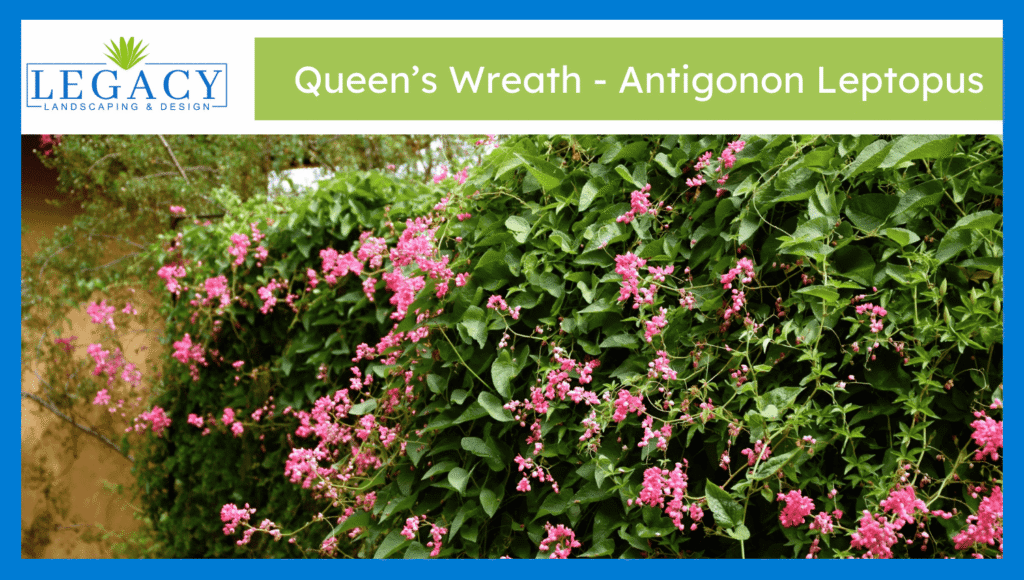Queen’s Wreath (Antigonon leptopus) is a vine that quickly grows and produces flowers in Mexico. It has heart-shaped leaves and grows in clusters of bright pink. A vine can grow to a length of 40 feet and needs a warm and sunny climate. Its beautiful flowers attract different pollinators such as bees and butterflies. Queen’s Wreath grows best in soil that drains well and can handle dry periods after becoming established. You can grow it on fences, frames, or walls for added beauty. Its green leaves and pretty flowers help beautify gardens in arid and semi-arid places and also provide shade.
| Characteristic | Description |
| Scientific Name | Antigonon leptopus |
| Common Name | Queen’s Wreath |
| Size | Fast-growing vine that can reach 20 to 40 feet in length with support. |
| Appearance | Vigorous climbing vine with heart-shaped green leaves and tendrils; lush and dense foliage. |
| Spines | No spines; climbs using curling tendrils. |
| Flowers | Clusters of bright pink (sometimes white) flowers; small, five-petaled, and very showy; attract pollinators. |
| Fruits | Small, dry fruits containing seeds; can self-seed in favorable climates. |
| Root System | Tuberous root system that stores water; contributes to drought tolerance and vigorous regrowth. |
| Lifespan | Perennial vine; long-lived with proper maintenance. |
| Habitat | Native to Mexico; thrives in warm, dry to semi-tropical climates. |
| Water Storage | Stores moisture in tuberous roots, aiding survival in dry conditions. |
| Growth Rate | Rapid growth in warm weather; can quickly cover trellises or fences. |
| Flowering Time | Blooms from late spring through fall, especially after summer rains. |
| Reproduction | Reproduces by seeds and tubers; can spread aggressively in suitable environments. |
Table of Contents
Can I Grow Queen’s Wreath from Seed?
Yes, It is possible to grow Queen’s Wreath using seeds. Soak the seeds in water for 24 hours before you plant them, since their hard covering is best weakened by water. A few weeks may be needed for germination to happen. Place the plants in soil that allows for good drainage and choose a sunny area. Tubers or cuttings allow for faster growth, but growing from seeds is more affordable.
Can I Put the Queen’s Wreath with My Tortoise?
Queen’s Wreath is usually not thought to be toxic for tortoises, but it is best to use caution. The effects it has on reptiles are not clear yet. If your tortoise consumes plants, make sure the plants are safe. Make sure to observe the tortoise and seek advice from a vet or herpetologist before giving the tortoise a new plant.
Is the Queen’s Wreath Toxic to Dogs?
According to the ASPCA, Queen’s Wreath is not listed as toxic to dogs. There are pets that may suffer stomach upsets if they come across plants they have not seen before. Make sure your dog stays away from the leaves and flowers. When you notice vomiting, lack of energy or drooling in your pet, contact your vet immediately for advice.
What Animals Eat Queen’s Wreath?
Many pollinators like bees, butterflies, and hummingbirds are commonly seen around Queen’s Wreath. Larger animals typically avoid the plant, yet livestock and goats can eat its leaves when they can reach them. Leaves can also be eaten by insects such as beetles. People mainly grow them as ornamental plants, but in tropical and subtropical places, their flowers and leaves are eaten by different creatures.
About The Author
Isaiah Espinoza
Isaiah Espinoza is the proud company owner, founder and driving force behind Legacy Landscaping and Design. Isaiah established Legacy Landscaping & Design in 2014, bringing his vision of creating stunning outdoor spaces to life. Isaiah, the founder of Legacy Landscaping & Design, has a deep-rooted passion for construction and design, stemming from four generations of family expertise in the industry. With a KB-1 General Building License and a CR-21 Hardscaping and Irrigation License, Isaiah has spent the past decade transforming outdoor spaces with exceptional craftsmanship and innovative design.

